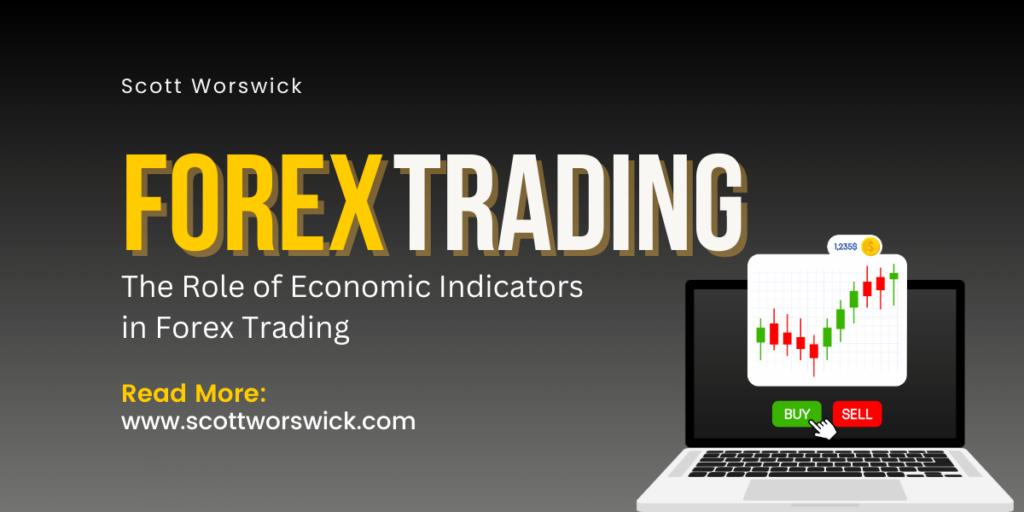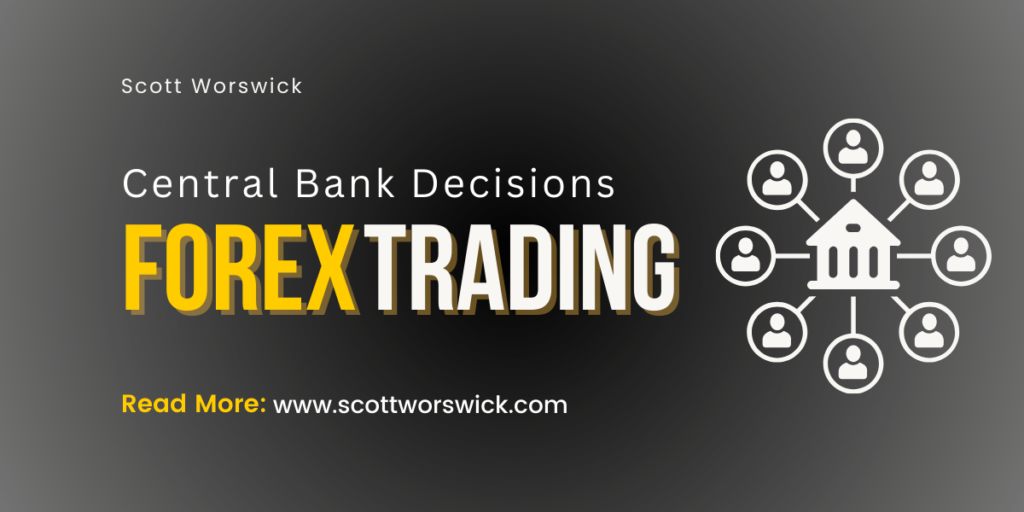Forex trading, also known as the foreign exchange market, is a vast and dynamic financial domain where currencies are bought and sold. It is the largest financial market globally, with a daily trading volume exceeding $6 trillion, making it a highly attractive arena for investors and traders. The allure of forex trading lies in its potential for significant profits, driven by the constant fluctuation of currency values. However, the volatility of the forex market also means that it is heavily influenced by a myriad of factors, with global events being among the most impactful. Understanding how these events shape the forex market is crucial for traders aiming to navigate its complexities and capitalize on opportunities.
Global events, ranging from economic indicators and political shifts to natural disasters and central bank decisions, can profoundly impact forex trading. For instance, an unexpected political election result or a sudden change in trade policy can lead to significant currency movements, creating both risks and opportunities for traders. The COVID-19 pandemic is a prime example of how a global crisis can lead to unprecedented market volatility. As traders strive to predict and respond to these events, they must stay informed and agile, adjusting their strategies to mitigate risks and optimize returns. By comprehensively understanding the impact of global events on forex trading, traders can enhance their decision-making processes and improve their chances of success in this fast-paced market.
Table of Contents
1. The Role of Economic Indicators in Forex Trading

Economic indicators are vital tools in the arsenal of a forex trader, providing critical insights into the economic health of a country and influencing currency values. These indicators include GDP growth rates, employment figures, inflation rates, and interest rates, each offering a glimpse into different facets of an economy. For instance, a robust GDP growth rate typically signals a strong economy, which can lead to a strengthening of the national currency. Conversely, high unemployment rates may indicate economic instability, often resulting in a weaker currency. Forex traders closely monitor these indicators, as they offer valuable clues about potential market movements and help in making informed trading decisions.
The significance of economic indicators in forex trading cannot be overstated. Interest rates set by central banks, for example, play a pivotal role in determining a currency’s value. When a central bank raises interest rates, it usually attracts foreign capital, leading to an appreciation of the currency. On the other hand, lowering interest rates can make a currency less attractive to investors, causing its value to drop. Inflation rates also impact currency strength, as high inflation can erode purchasing power and weaken the currency. By analyzing these indicators, traders can anticipate economic trends and adjust their strategies accordingly, enhancing their ability to navigate the complexities of the forex trading market successfully.
2. Political Events and Their Impact
Political events play a crucial role in shaping the landscape of forex trading. Elections, policy changes, and political stability or instability can all significantly impact currency values. For instance, an election outcome that leads to a stable and investor-friendly government typically boosts market confidence, resulting in a stronger national currency. Conversely, political turmoil or an unexpected shift in government policies can create uncertainty, causing investors to flee and the currency to depreciate. Forex traders must pay close attention to political events and understand their potential implications to navigate the market effectively.
Policy changes, particularly those related to fiscal and monetary policies, are another critical aspect of political events that can influence forex trading. A government’s decision to increase public spending or cut taxes can stimulate economic growth, which may strengthen the currency. On the other hand, austerity measures or restrictive fiscal policies might lead to slower economic growth and a weaker currency. Similarly, central banks’ monetary policy decisions, such as changes in interest rates or quantitative easing measures, are often driven by political considerations and can significantly affect currency values. Forex traders need to analyze these policy shifts and adjust their strategies accordingly to capitalize on market movements.
Political events also extend to international relations and geopolitical tensions, which can create volatility in the forex market. Trade agreements, sanctions, and diplomatic conflicts can all influence currency values. For example, a trade agreement between two major economies can boost their currencies by fostering economic growth and stability. Conversely, geopolitical tensions, such as conflicts or trade wars, can lead to market uncertainty and cause currency depreciation. By staying informed about global political developments and understanding their potential impacts, forex traders can better manage risks and identify opportunities in the market. This vigilance and adaptability are essential for success in the dynamic world of forex trading.
3. Natural Disasters and Global Crises
Natural disasters and global crises can have profound and often immediate impacts on forex trading. Events such as earthquakes, hurricanes, and pandemics can disrupt economic activities, leading to significant currency fluctuations. For instance, when a natural disaster strikes, the affected country may experience a sudden decline in economic productivity as infrastructure is damaged and businesses are forced to close. This disruption can weaken the national currency as investors lose confidence in the economy’s short-term stability and withdraw their investments. Forex traders must remain vigilant and responsive to these events to protect their positions and capitalize on the resulting market movements.
The COVID-19 pandemic is a prime example of how a global crisis can affect forex trading. As the virus spread worldwide, countries implemented lockdowns and social distancing measures that drastically reduced economic activity. This unprecedented situation led to heightened volatility in the forex market, with currencies experiencing sharp and unpredictable swings. Central banks and governments responded with various measures, such as interest rate cuts and fiscal stimulus packages, to mitigate the economic impact. Forex traders who closely monitored these developments were better equipped to adjust their strategies, manage risks, and exploit trading opportunities arising from the market turbulence.
Global crises and natural disasters often trigger coordinated responses from international organizations and governments, which can further influence forex trading. For instance, in the wake of a significant natural disaster, international aid and financial support can help stabilize the affected country’s economy and currency. Similarly, global health crises like pandemics may lead to international collaborations and policy measures aimed at economic recovery. These collective efforts can instill confidence in the markets and impact currency values positively or negatively, depending on their effectiveness. Forex traders need to stay informed about such responses and their potential effects on the forex market to make informed trading decisions and optimize their outcomes in a rapidly changing environment.
4. Central Bank Decisions
Central bank decisions are pivotal in the realm of forex trading, as these institutions have the power to influence currency values through their monetary policies. Central banks, such as the Federal Reserve, the European Central Bank, and the Bank of Japan, regularly make decisions regarding interest rates, inflation targets, and other financial measures to manage their respective economies. When a central bank raises interest rates, it often leads to an appreciation of the national currency, as higher rates attract foreign investors seeking better returns on their investments. Conversely, lowering interest rates can lead to a depreciation of the currency, as it becomes less attractive to investors. Forex traders closely monitor central bank announcements to anticipate these changes and adjust their trading strategies accordingly.
In addition to interest rates, central banks also utilize quantitative easing (QE) and quantitative tightening (QT) to influence economic activity and, consequently, currency values. QE involves the purchase of government securities or other financial assets to increase the money supply and stimulate the economy. This influx of money can lead to a depreciation of the currency, as the increased supply reduces its value. On the other hand, QT involves selling off these assets to decrease the money supply, which can strengthen the currency by making it scarcer. Forex trading strategies must take into account these monetary policy tools, as they can significantly impact market dynamics and currency valuations.
Central bank decisions are often influenced by broader economic indicators and global events, adding another layer of complexity to forex trading. For example, in times of economic crisis or uncertainty, central banks may implement emergency measures, such as significant interest rate cuts or extensive QE programs, to stabilize the economy. These decisions can lead to increased volatility in the forex market, as traders react to the new policies and adjust their positions. Understanding the rationale behind central bank actions and their potential impact on currency values is crucial for forex traders. By staying informed about central bank policies and their economic context, traders can better navigate the market and make more informed trading decisions.
5. International Trade and Forex Trading
International trade plays a significant role in the dynamics of forex trading, as the exchange of goods and services between countries directly influences currency values. When a country exports more than it imports, it typically experiences a trade surplus, which can lead to an appreciation of its currency. This is because foreign buyers must purchase the exporting country’s currency to pay for its goods, increasing demand and driving up its value. Conversely, a trade deficit, where a country imports more than it exports, can result in a depreciation of its currency due to the increased outflow of domestic currency. Forex traders closely analyze trade balances and trends to predict currency movements and adjust their trading strategies accordingly.
Trade agreements and disputes are critical factors that can impact international trade and, consequently, forex trading. When countries enter into trade agreements, they often reduce tariffs and other barriers, promoting increased trade flows and economic cooperation. These agreements can strengthen the involved currencies by fostering economic growth and stability. On the other hand, trade disputes and the imposition of tariffs can disrupt trade relationships and create uncertainty, leading to currency depreciation. For instance, the US-China trade war caused significant volatility in the forex market, as traders reacted to the escalating tariffs and shifting trade policies. Understanding the implications of trade policies and agreements is essential for forex traders aiming to navigate the market effectively.
Moreover, fluctuations in commodity prices can also impact international trade and forex trading. Countries that are major exporters of commodities, such as oil, gold, or agricultural products, are particularly sensitive to changes in global commodity prices. A rise in commodity prices can boost the export revenues of these countries, leading to an appreciation of their currencies. Conversely, a decline in prices can reduce export earnings and weaken the currency. Forex traders must monitor global commodity markets and their potential impact on currency values. By staying informed about international trade dynamics and their influence on forex trading, traders can better anticipate market movements and develop strategies to optimize their trading outcomes.
6. Market Sentiment and Speculation
Market sentiment and speculation are powerful forces that drive forex trading, often leading to significant currency movements based on collective trader perceptions and reactions. Market sentiment refers to the overall attitude of investors toward a particular currency or the market as a whole. It is influenced by various factors, including economic data releases, geopolitical events, and financial news. Positive sentiment, driven by favorable economic reports or political stability, can lead to increased demand for a currency, causing it to appreciate. Conversely, negative sentiment, fueled by poor economic performance or political uncertainty, can result in currency depreciation. Forex traders must gauge market sentiment to anticipate trends and make informed trading decisions.
Speculation, on the other hand, involves traders making bets on future currency movements based on their analysis and predictions. Speculators play a crucial role in the forex market by providing liquidity and helping to determine exchange rates. However, speculative activities can also lead to heightened volatility, as large volumes of trades are executed based on expected rather than actual economic outcomes. For example, if traders speculate that a central bank will raise interest rates, they might buy the currency in anticipation, driving up its value even before the official announcement. Understanding speculative behavior and its impact on the market is essential for forex traders to navigate potential price swings effectively.
The interplay between market sentiment and speculation can create feedback loops that amplify currency movements. For instance, if positive sentiment leads to currency appreciation, speculators may jump on the trend, further boosting the currency’s value. Conversely, negative sentiment can trigger speculative selling, exacerbating a currency’s decline. Forex traders need to be aware of these dynamics and use technical and fundamental analysis to decipher market sentiment and speculative patterns. By staying attuned to the psychological and speculative aspects of the forex market, traders can better position themselves to capitalize on opportunities and mitigate risks, enhancing their overall trading performance in this fast-paced environment.
Conclusion
In conclusion, the impact of global events on forex trading is profound and multifaceted. Economic indicators, political events, natural disasters, central bank decisions, international trade dynamics, and market sentiment all play critical roles in shaping currency values and market conditions. Forex traders must remain vigilant and well-informed about these factors to navigate the market effectively. By understanding how these global events influence forex trading, traders can develop more robust strategies, anticipate market movements, and manage risks more effectively. This comprehensive awareness allows traders to capitalize on opportunities and respond swiftly to market changes.
Ultimately, success in forex trading requires a keen understanding of the intricate relationships between global events and currency movements. Traders who stay abreast of economic reports, monitor political developments, respond to natural disasters and global crises, analyze central bank policies, and assess market sentiment and speculative trends are better equipped to thrive in this dynamic market. By integrating this knowledge into their trading strategies, forex traders can enhance their decision-making processes, improve their trading outcomes, and achieve long-term success in the ever-evolving landscape of the forex market.






Pingback: Forex Trading vs Traditional Investment Vehicles: A Comparative Analysis -
Simply wish to say your article is as amazing The clearness in your post is just nice and i could assume youre an expert on this subject Well with your permission let me to grab your feed to keep updated with forthcoming post Thanks a million and please carry on the gratifying work
Thanks for sharing such useful information! I’ve been searching for insights on this topic, and your post is by far the best I’ve found. Looking forward to seeing more from you.